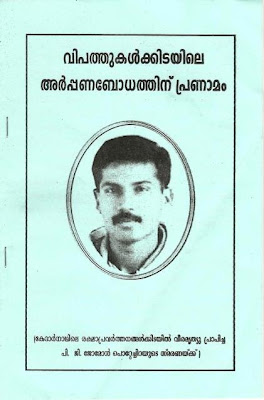"You feel small in the
presence of dead men, and ashamed at being alive, and you don’t ask silly
questions." These words are from The
Death of Captain Waskow, Earnie Pyle’s most popular
World War II report. He wrote this after watching the American dead being
brought down on mule backs from a hill on the Italian front lines on January 10,
1944.
 Ernest
Taylor Pyle (August 3, 1900 – April 18,
1945) was perhaps the greatest war reporter of all times. Surprisingly, he
never graduated. He joined the US Navy Reserve during World War I but the war
was over within a few months. Then the man turned to journalism. He became America’s first
aviation columnist in 1928. By 1932 he became the managing editor of the Daily News. After America entered
the war he started reporting from the European Theatre.
Ernest
Taylor Pyle (August 3, 1900 – April 18,
1945) was perhaps the greatest war reporter of all times. Surprisingly, he
never graduated. He joined the US Navy Reserve during World War I but the war
was over within a few months. Then the man turned to journalism. He became America’s first
aviation columnist in 1928. By 1932 he became the managing editor of the Daily News. After America entered
the war he started reporting from the European Theatre.
The readers of nearly 300 newspapers in the US waited for his reports great eagerness. He told them of the war from the angle of the GIs – of their suffering and sacrifices, longing and depression, fear and loneliness, dignity and courage in the face of danger. The feelings went deep inside the readers. They were living the GI life through the Ernie Pyle reports, praying and hoping that the war would end soon.
 Ernest
Taylor Pyle (August 3, 1900 – April 18,
1945) was perhaps the greatest war reporter of all times. Surprisingly, he
never graduated. He joined the US Navy Reserve during World War I but the war
was over within a few months. Then the man turned to journalism. He became America’s first
aviation columnist in 1928. By 1932 he became the managing editor of the Daily News. After America entered
the war he started reporting from the European Theatre.
Ernest
Taylor Pyle (August 3, 1900 – April 18,
1945) was perhaps the greatest war reporter of all times. Surprisingly, he
never graduated. He joined the US Navy Reserve during World War I but the war
was over within a few months. Then the man turned to journalism. He became America’s first
aviation columnist in 1928. By 1932 he became the managing editor of the Daily News. After America entered
the war he started reporting from the European Theatre. The readers of nearly 300 newspapers in the US waited for his reports great eagerness. He told them of the war from the angle of the GIs – of their suffering and sacrifices, longing and depression, fear and loneliness, dignity and courage in the face of danger. The feelings went deep inside the readers. They were living the GI life through the Ernie Pyle reports, praying and hoping that the war would end soon.
Ernie Pyle never glorified
the war. As John
Steinbeck commented, he was telling the story of the ordinary GI out there
on the war field. Hollywood
made a movie, “GI Joe” based on his writings. The collections of his reports
became best sellers. There are a few of
them of them: Here Is Your War, Brave Men, Last Chapter, Home Country, Ernie’s War:
The Best of Ernie Pyle’s World War II Dispatches, Ernie’s America: The Best of
Ernie Pyle’s 1930s Travel Dispatches, Ernie Pyle’s Southwest, and On A Wing
& A Prayer. Some of these books have been translated to other languages.
Ernie Pyle did something
more for the GIs. In 1944 he mooted the idea that the soldiers on the war field
should get a “fight pay”. Those days the Air Force was disbursing “flight pay"
to the airmen. The suggestion was accepted by the Congress in what is known as
‘The Ernie Pyle Bill’ and the GIs in combat started getting $10 per month
extra.
The
writer won the Pulitzer Prize
for journalism in 1945 and also the Purple Heart. The United States issued a postage
stamp in his honour. But I feel that the greatest tribute to him was by the
employees of Boeing-Wichita. They built a Boeing B-29 Superfortress at their
own expense using the 7th War Loan
Drive and named it The Ernie Pyle. The
plane which was sent to the Pacific survived the Second World War but the
journalist did not. Two weeks before The Ernie Pyle reached its assigned
destination, Ernie Pyle was dead.
In
1945 Ernie Pyle had shifted to the Pacific War Theatre. On April 18, he was
shot dead by the Japanese on Ie Shima, an island off Okinawa. He was
buried there but his remains were later shifted to the National Memorial
Cemetery of the Pacific at Honolulu.
Former American
President Harry S. Truman’s tribute to Ernie Pyle was appropriate: “No man in this war has so well told the story of the
American fighting man as American fighting men wanted it told.... He deserves
the gratitude of all his countrymen."
Way
back in college in the early 1950s I came across a copy of Brave men. It
impressed me a great deal. I wanted write about the book, write about the man
who authored it and write like him. Sixty years later I have achieved, with
this article, the first two parts of my wish. Forget the third wish
because I’ll never be able to write like Ernie Pyle.
■
Related
Post:







